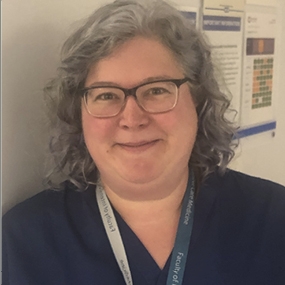Becoming an FRCA examiner

Dr Liz Thomas is a consultant in anaesthesia and intensive care medicine at the Stockport NHS Foundation Trust. She is passionate about helping trainees through their career and recently became an examiner for the Final FRCA.
I am proud to have led the organisation of Final FRCA examination preparation courses in the North West school of anaesthesia. For over 10 years, I have been helping trainees prepare locally for their FRCA examinations. Having received invaluable help myself during my career, I’m keen to help others in the same way. The exam is felt to be the biggest hurdle and it is an honour to help trainees by being an examiner.
I want to help develop the future of anaesthesia and maintain the high standards of training and patient safety. A FRCA Viva is the last hurdle and formal assessment for anaesthetic junior doctors, it is an oral exam made up of largely clinical cases but also testing knowledge of basic sciences. I really enjoy this process; it keeps my knowledge up to date, helps me stay abreast of the recent evidence, and allows knowledge to be shared between the trainees and myself.
The application form to become an examiner is straight forward – there’s no need for a CV and some new examiners start straight with the Final FRCA, which I requested to do as I had most experience helping trainees prepare for the final.
Recently, I received my examiner training. It was a really interesting day, covering all examiner duties and responsibilities, as well as explaining the structure, planning and marking of each part of the exam. We were also able to practice with the online Viva system. I also learnt a lot about the steps the College takes to ensure examiners are fair and of a high quality. I will be regularly audited and be given feedback regarding my performance plus have annual examiner appraisals.
I have found it really interesting to meet the people at the College responsible for the exams and see how much work goes into facilitating them. I think perhaps they often go unrecognised by some and it takes considerable time and effort to ensure that the exam runs well and that the questions are of a high standard.
Exam week can be very long for the examiners, especially now it has to be done by virtually. We start work at 7am and finish at 6.30pm. The College are trying to create as many exam slots as possible as there are less candidate places with the exam taking place virtually, hence the need for the long days. But the training is good, and I feel prepared to start and ready for what lies ahead.
Being a part-time examiner is now an option as well, which makes the exam more accessible for people who cannot commit to the large chunks of time for the entire exam week. However, to maintain a high standard there is a minimum commitment and the first year must be a full-time commitment.
Every examiner I have spoken to says it’s the best thing they’ve done in their career and brims with pride when talking about it. The College website has details of the latest FRCA examiner recruitment opportunities and from my experience so far, I would encourage anyone eligible to consider becoming an examiner.
Dr Liz Thomas
